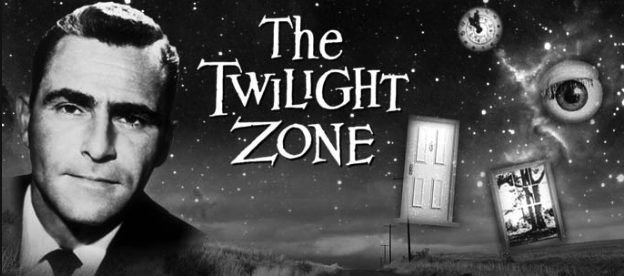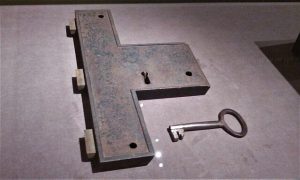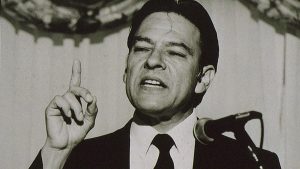I think it’s criminal that we are not permitted to make dramatic note of social evils that exist, of controversial themes as they are inherent in our society. I think it’s ridiculous that drama, which by its very nature should make a comment on those things which affect our daily lives, is in a position, at least in terms of television, of not being able to take that stand. —Rod Serling (1959)
Rod Serling, born Edwin Rodman Serling on December 25, 1924, would become one of America’s most important writers and producers of television dramas and screenplays primarily because of his vocal disapproval of censorship in the media. Before he began to seek new forms of media with minimal censorship, he was a successful writer for Playhouse 90, an American anthology drama. There, he wrote emmy-award winning scripts for “Patterns” (1955), a dramatization about corporate power, and “Requiem for a Heavyweight” (1956), which showed the struggles of a retired boxer in the aftermath of his 17-year career.1 However, it was Serling’s “A Town Has Turned to Dust” that would be his most controversial moment as part of the Playhouse 90 crew and would lead him into his next project as a writer. “A Town Has Turned to Dust” followed the story of Emmett Till, the young black boy brutally murdered in 1955 for allegedly whistling at a white woman in Mississippi. CBS decided to censor Serling’s script by making the black boy that was supposed to represent Till into a Mexican boy; they also made it seem as though it was the boy’s fault by depicting him as “getting out of line.”2 The network’s censorship removed many of the painful truths regarding the prejudices in America during this time. Serling would turn to the avenue of science fiction in order to escape this kind of censorship; in the words of Serling, “You know, you can put these words into the mouth of a Martian and get away with it.” Serling’s desire to get away from censored forms of media led to the creation of The Twilight Zone (1959-1964), a science fiction series that showcased people’s greatest fears ranging from alien invasion, death, ghosts, and even the effects of the Cold War on American society.3

Along with his criticism towards racial prejudice, Serling had his objections to the Cold War. The themes of the Cold War were largely absent from sitcoms and dramas during the 1950s; however, the episodes of The Twilight Zone, titled “The Shelter” (1961) and “Third from the Sun” (1960), discuss the effects of the Cold War head-on.4 In these two episodes, Serling brings forth the fears of the American people that were prevalent during the Cold War era (1945-1991) in terms of the overall anxiety and anticipation for a nuclear holocaust as well as the effects that the arms race had on the American psyche.
“Third from the Sun” deals more directly with the arms race and the creation of the hydrogen bomb. It was believed that the Americans were the only ones in possession of the atomic bomb; however, in 1949, the Soviets tested their first atomic bomb leading Truman to begin the quest for creating a more powerful bomb—the hydrogen bomb.5 Before the creation of this bomb, many people questioned the necessity of it. Would America win the arms race and would that be the end of it? Or would Russia create a hydrogen bomb as well? To address this question with our knowledge now, when the United States created the first hydrogen bomb in 1952, the Soviets followed suit with the creation of their first hydrogen bomb in 1955.6 Now, two nations were in possession of the world’s most powerful bomb. As Harold C. Urey stated, “Suppose that two countries have the hydrogen bomb…I would say that the probability that a war will start is increased if two groups each believe that they can win that war.”7 With the creation of the hydrogen bomb in both the U.S. and Russia, both countries were capable of obliterating the other. This is seen in “Third from the Sun” when Will Sturka, a scientist that works on hydrogen bomb production, learns from a suspicious coworker that the company planned on setting off a bomb in 48 hours. With this information, Sturka and his friend, Jerry Riden, a pilot of an experimental spacecraft, decided that it was time to move to Earth, the third planet from the Sun, in order to save their family from a nuclear holocaust. Hypothetically, we see that in the case of a nuclear holocaust, due to the mass destruction and horrors that a hydrogen bomb would produce, moving to another planet would be the best option. However, how many people have that option? Serling questions the necessity of using a hydrogen bomb because in the end, no one wins and all it brings is devastation and death.8

In relation, “The Shelter” shows the anxiety and hysteria that laid within the minds of the American people, knowing that at any moment, the enemy could drop a bomb on America and everything would change. In this episode, Dr. Stockton’s birthday party was interrupted by a radio announcement that there was a detection of a UFO, most likely missiles, en route to the U.S. and everyone is advised to seek shelter. Out of all the people present at the party, Dr. Stockton was the only one who had a shelter prepared. While everyone frantically ran to their houses to figure out what to do, Dr. Stockton and his family started to collect water, food, and things for entertainment into the shelter. The neighbors began to come back to Dr. Stockton’s house and tried to guilt him into letting them stay in his shelter with his family; however, the shelter could efficiently protect only three people. After the doctor refuses to allow any of the neighbors into his shelter, the neighbors try to break into the shelter in their last attempt to save themselves. At the end of the show, the advisory is called off and the friends of Dr. Stockton are ashamed that they put him and his family’s lives in danger because they were not prepared for a missile attack. Serling is sending a powerful message about the unpleasant aspects of human nature that can occur in life-or-death situations, as well as the importance of being prepared for this worst (even though people did not want to think about it).9

From these two episodes of The Twilight Zone, we see the ugly tendencies of human nature in regards to selfishness during a crisis in order to save one’s self, the unfortunate willingness of countries to bring another country to complete destruction via hydrogen bomb, and the importance of disaster preparedness. If Serling had tried to write these scripts for Playhouse 90, the messages would most likely have been completely distorted by the network’s need to censor material in order to protect their interests. The beauty of The Twilight Zone came from the fact that Serling could deliver powerful, uncensored messages in a half-hour span, delving into people’s worst fears and opening their eyes to the harsh reality that was bestowed upon them.

In 1964, after airing one-hundred-fifty-six episodes, The Twilight Zone was cancelled and Serling took to the lecture circuit where he delivered speeches to crowds in which he was able to speak more freely and openly. Just as Serling showed his disapproval for the Cold War in these two episodes of The Twilight Zone, he often talked about his disapproval for the Vietnam War in his lectures: “America’s destiny…lies on the streets of Newark, Miami, Chicago, Los Angeles and Harlem…not in Saigon. And certainly not at the cost of twenty-thousand dead American boys.” 10 In his lectures, Serling did not have to put these words into the mouth of a martian. Through his lectures, Serling was now able to express the emotions that so many Americans felt during times of war in a more direct way—without the necessity of crafting a masterful thirty-minute, science-fiction episode just to escape the scrutiny of media censorship.
- Encyclopedia Britannica, 2016, s.v. “Rod Serling.” ↵
- Meredith Brenner, “Thirty Minute Reality Check: How The Twilight Zone Reflected American Society in the 1950s,” (Thesis, University of Maryland, College Park, 2004), 1. ↵
- Meredith Brenner, “Thirty Minute Reality Check: How The Twilight Zone Reflected American Society in the 1950s,” (Thesis, University of Maryland, College Park, 2004), 1. ↵
- Heather Lunney, “Exploring the Cold War through The Twilight Zone: Five episodes in a journey to a dimension of sight, sound and mind,” History in the Making Vol. 3, no. 1 (2014): 40. ↵
- Richard Dean Burns and Joseph M. Siracusa, A Global History of the Nuclear Arms Race: Weapons, Strategy, and Politics 2 Volumes: Weapons, Strategy, and Politics (Santa Barbara, CA: Praeger, 2013), 37. ↵
- Richard Dean Burns and Joseph M. Siracusa, A Global History of the Nuclear Arms Race: Weapons, Strategy, and Politics 2 Volumes: Weapons, Strategy, and Politics (Santa Barbara, CA: Praeger, 2013), 34. ↵
- Harold C. Urey, “Should America Build the H-Bomb?,” Bulletin of the Atomic Scientists, March 1, 1950, 73. ↵
- “The Shelter,” The Twilight Zone, directed by Lamont Johnson (Los Angeles: CBS, 1960). ↵
- “The Shelter,” The Twilight Zone, directed by Lamont Johnson (Los Angeles: CBS, 1961). ↵
- Rod Serling (lecture presented at Moorpark College, Moorpark, CA, December 3, 1968). ↵



76 comments
Luis Molina Lucio
The Twilight Zone sounded like a great show which I have never heard of but I might have to watch some of it. The article did a great job at entertaining the reading through the description of one of the show’s episodes. For a moment there I thought it was an actual event until I read that it was a show which left me with a feeling of “woah”. Very entertaining article while still informing of s show that could have played some role in the lives of people who lived similar life’s as characters in the show.
Irene Urbina
I enjoyed this article. I find it interesting how Serling used his skills and platform to transmit messages that spoke to people and provoke people to think about the situation. I did not watch The Twilight Zone, but I have heard about it and this article showed me one of the possible reasons as to why it was so popular. I am glad that the cancellation of the show did not stop him from expressing his opinions to people.
Carlos Hinojosa
I loved the twilight zone because it talked about scenarios or what if’s that no-one ever talks about. Like the article mentioned ghosts, death and sometimes it would give a moral to the story like I remember one episode was about how whoever was in charge determines what’s beautiful and ugly. Or the family full of greed that they became horribly disfigured. I also liked those stories and the messages that were behind them. Very good article.
Dylan Miller
The article was a fascinating read! I’ve always loved The Twilight Zone, and the concepts that were shown in the show. So finding out what they really mean, and the political advocacy that the show and Sterling brought makes me respect both of them immensely more than I already did! The article’s writing style really hooked me in, and perfectly entailed Sterling’s passion for less censorship in American Television!
Serenity Kamenski
I’ve only seen a couple of episodes of The Twilight Zone, but I do recall watching “The Shelter” before. From what I can remember, the neighbors were so desperate to save themselves, going as far as risking the safety of their friend and his family. The episode carried a heavy message on what human nature can succumb to in certain situations, and it terrifying to know we could act the same way if given the chance. Rod Sterling is a brilliant writer, and his shows prove that over and over again. Amazing article.
Lauren Castaneda
I was always a big fan of The Twilight Zone growing up but never knew the real meaning behind the episodes. I think Rod Sterling was a true an interesting creator that truly delivered a powerful message in each show. Looking at it from an ordinary standpoint, I see how his messages were to to prepare humans for unpleasant situations because of what the world was encountering throughout.
Matthew Swaykus
In reading this article, it is clear that Rod Serling was a man ahead of his time. Rod dared to ask the hard questions directly, ones that force you to question the morality of your country, your people, and from there, the nature of people itself. I appreciate how the author presents just a few of Rod’s accredited works; often times, we only hear about the artist or creator and not what his or her work.
Amariz Puerta
This was a very well written article and I enjoyed reading it. I had never really have been a fan of Twilight Zone but I knew that so many people were. I really liked how this article was articulated and how they fought back about how things were censored. I really enjoyed the conclusion of the article and how the protagonist was able to break through his shell.
Antonio Coffee
I had no clue that Rod Sterling used the Twilight Zone as a way to spread messages that would otherwise be censored. I think this was a creative way of doing this and was a great way to get around and avoid censorship of hot button issues. I have always enjoyed the twilight zone and I look up to it a great show that really explored how humanity responds to different issues and in crisis.
Averie Mendez
I watch the Twilight Zone from time to time if I’m completely stumped on what to watch on Netflix, and, call me unobservant, but I never noticed any of the hidden messages in the episodes, so I’m glad this article brought that to my attention. I was also surprised to know that Rod Sterling wanted to shed light on the Emmett Till incident, but couldn’t due to the racially discriminative censorship at the time.